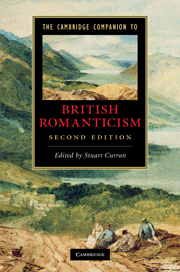Book contents
- Frontmatter
- 1 Romanticism and the “schools” of criticism and theory
- 2 Romanticism and Enlightenment
- 3 Poetry in an age of revolution
- 4 German Romantic Idealism
- 5 Romanticism and language
- 6 Culture’s medium: the role of the Review
- 7 Publishing and the provinces in Romantic-era Britain
- 8 Women readers, women writers
- 9 Romantic fiction
- 10 Romantic poetry: why and wherefore?
- 11 The sister arts in British Romanticism
- Guide to further reading
- Index
3 - Poetry in an age of revolution
Published online by Cambridge University Press: 28 January 2011
- Frontmatter
- 1 Romanticism and the “schools” of criticism and theory
- 2 Romanticism and Enlightenment
- 3 Poetry in an age of revolution
- 4 German Romantic Idealism
- 5 Romanticism and language
- 6 Culture’s medium: the role of the Review
- 7 Publishing and the provinces in Romantic-era Britain
- 8 Women readers, women writers
- 9 Romantic fiction
- 10 Romantic poetry: why and wherefore?
- 11 The sister arts in British Romanticism
- Guide to further reading
- Index
Summary
Poets are no more insulated from political events and controversies than are any other class of people. Indeed, they are less so, in that poets work in language, the same medium in which political concepts and demands are formulated, contested, and negotiated. If this is generally true it is of particular relevance in periods of significant historical change, when political issues impress themselves with increased urgency on all sections of society and give rise to vigorous debates concerning fundamental political principles. The period between 1780 and 1830, during which the great Romantic poets came to maturity and produced their most important works, was such a period, as they were all aware. Wordsworth told an American visitor that “although he was known to the world only as a poet, he had given twelve hours thought to the conditions and prospects of society, for one to poetry.” Coleridge and Southey were both active as political journalists, and Coleridge produced a number of significant works of political theory. Byron spoke on political issues in the House of Lords, as well as satirizing political opponents and the political situation in general in his poetry. Shelley wrote to his friend Peacock, “I consider Poetry very subordinate to moral & political science, & if I were well, certainly I should aspire to the latter” (Shelley, Letters, II, 71).
- Type
- Chapter
- Information
- The Cambridge Companion to British Romanticism , pp. 56 - 81Publisher: Cambridge University PressPrint publication year: 2010

